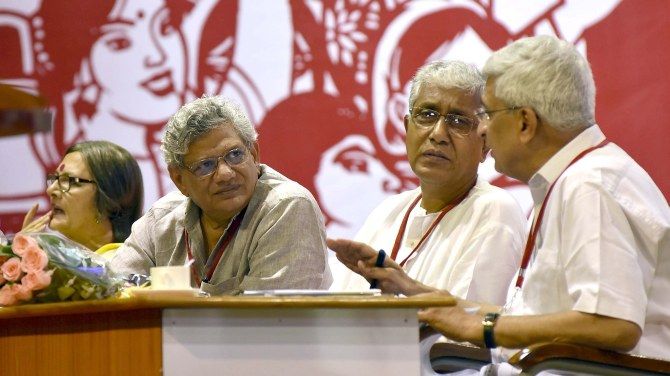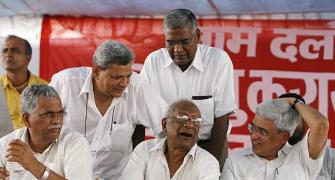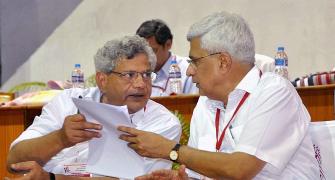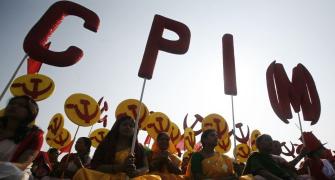'Manik Sarkar may have been able to hang on if he hadn't been a follower of the CPI-M's all-time hardliner Prakash Karat,' argues Amulya Ganguli.

IMAGE: Manik Sarkar flanked by Prakash Karat, to his left, and Sitaram Yechury at the CPI-M's 21st national congress in Visakhapatnam, April 2015. Also seen: Brinda Karat. Photograph: PTI Photo
Arguably, there was no way the CPI-M could have held on to Tripura.
A quarter of a century in power is an eternity in politics.
No matter how good is a government, the people tend to get tired of seeing the same faces, hearing the same voices, listening to the same rhetoric year after year.
Irrespective of how 'clean' and indigent -- the 'poorest' chief minister in the country -- Manik Sarkar was, he must have sensed that his time was up.
Even then, he might have been able to hang on if he hadn't been a follower of the former CPI-M general secretary and all-time hardliner, Prakash Karat.
If Sarkar had listened instead to what the present general secretary and acknowledged moderate, Sitaram Yechury, had been saying, he might have saved the last red bastion in eastern India by forging an alliance with the Congress.
Had he done so, the CPI-M's own 40-plus per cent vote share would have combined with whatever little which the Congress could mop up -- even three or four cent -- to enable the red-tricolour combine offer an effective resistance to the BJP.
But Sarkar, in his hubris, didn't because he believes in Karat's damaging assessment of the Congress as a bourgeois-landlord party.
It was out of the question, therefore, for the party of international proletarianism to join hands with the class enemy.
It was better to go down while holding the red flag aloft.
Yechury's thinking, however, is different. He believes in picking one's adversaries one by one.
True, the Congress is an opponent in the purely Marxist world of the proletariat on one side and the bourgeoisie on the other.
But the Congress is a lesser danger in ideological terms because it is not fascistic.
It is possible, therefore, to team up with it to defeat the more dangerous enemy, the BJP.
This is the accommodative line which Yechury wants the CPI-M to follow while opposing the BJP in the next general election.
He asked his comrades at a recent conference in Kerala to remember, therefore, that the CPI-M is not the Communist party of Kerala, where the Congress is their main enemy and not the BJP.
Yechury has the backing of the Bengal comrades for this pro-Congress approach.
But Karat, who is from Kerala, will have none of it.
This is not the first time that the Bengalis and the Malayalis have squared off in their divergent interpretations of a tactical line.
The other well-known occasion was when the 'Bongs' under Jyoti Basu and Promode Dasgupta had opposed the decision of the 'Mallus' under E M S Namboodiripad to facilitate the toppling of the Morarji Desai government in 1979 to enable Charan Singh to become prime minister with the help of the Congress led by the pro-Soviet Indira Gandhi.
Dasgupta had called the manoeuvre the handiwork of the Soviet lobby in Delhi.
Another occasion when the Bengalis and the Malayalis did not see eye to eye was when Jyoti Basu's name was proposed as the prime minister in 1996.
Karat had led the opposition within the CPI-M to the initiative in a move which Basu had subsequently described as a 'historic blunder'.
It is too early to say whether Sarkar has committed a similar blunder under Karat's tutelage. But he has certainly given away his tiny state to the BJP.
One doesn't know how long the BJP will be able to hold on to Tripura since its partner in the state government, the Indigenous People's Front of Tripura (IPFT), a party of tribals, wants a separate state.
The Bengalis of Tripura, who have voted for the BJP in large numbers, will also be wary of the IPFT's intentions. There have been violent clashes between the two communities in the past.
It is also not known whether the BJP will be able to 'digest' the Congress which it has assimilated in the party.
It will take time for the tremors caused by these marriages of convenience to become apparent.
For the present, however, the main fallout of the election is the CPI-M's humiliation as a result of its adherence to Karat's version of Malayali Marxism.
Amulya Ganguli is a writer on current affairs.









